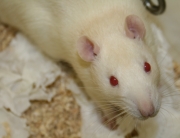Animals develop inflamed stomachs and other conditions when fed with “Frankenstein foods”
- Research significant because pigs organs are similar to humans
- U.S. trial found GM-fed female pigs had on average a 25 per cent heavier uterus than non-GM-fed females, which is a possible indicator of disease
- Environment Minister has dismissed GM scepticism as ‘complete nonsense’
Source: Daily Mail By SEAN POULTER, CONSUMER AFFAIRS EDITOR
GM crops could give pigs diseases, after scientists claimed those fed the so-called Frankenstein food had inflamed stomachs and heavier uteruses.
The research is significant because the digestive system and organs of pigs are similar to those of humans, who eat the pork from the animals.
A group of Britain’s biggest supermarkets recently ended a ban on the feeding of GM crops to pigs and other animals on farms in this country.
GM-fed female pigs had on average a 25 per cent heavier uterus than non-GM-fed pigs – a sign of disease
The trial involved 168 newly-weaned pigs in a commercial piggery in America.
Meat, milk and eggs from these animals is not labelled as having come from animals fed on GM crops.
The latest study will embarrass the Government, which supports GM crops and food, based on assurances that they have been proven safe for humans and the environment.
However, the research suggests this cannot be taken for granted.
It was led by Dr Judy Carman, associate professor in health and the environment at Flinders University, Australia.
She said GM-fed female pigs had on average a 25 per cent heavier uterus than non-GM-fed females, which is a possible indicator of disease.
Also, severe inflammation in stomachs was markedly higher in pigs on a GM diet. Calling the results ‘striking’, she added: ‘We found these results in farm conditions, not in a laboratory, but with the benefit of strict scientific controls. We need to investigate if people are also getting digestive problems from eating GM crops.’
The trial involved 168 newly weaned pigs fed either GM soya and corn, or an equivalent non-GM diet.
The pigs were reared under identical housing and feeding conditions, while they were slaughtered once they were over five months of age, which is normal for commercial production.
They were autopsied by qualified veterinarians who worked ‘blind’ – they were not informed which pigs were fed on the GM diet and which were not.
But Professor Tom Sanders, of King’s College, London, said: ‘There were no differences in growth and mortality rates and pigs appeared in similar health.’ A Cambridge professor, David Spiegelhalter, said: ‘The conclusions don’t stand up to statistical scrutiny.’
Iowa-based farmer and crop and livestock advisor Howard Vlieger, one of the coordinators of the study, said: ‘For as long as GM crops have been in the feed supply, we have seen increasing digestive and reproductive problems in animals. Now it is scientifically documented.
‘In some cases, animals eating GM crops are very aggressive. This is not surprising, given the scale of stomach irritation and inflammation now documented.’
The Biotechnology Industry Organisation said: ‘This study was authored by anti-biotech campaigners. Hundreds of independent studies found no difference between animals fed GM or non-GM diets.’
The news comes as Owen Paterson, Secretary of State for Environment, Food and Rural Affairs, claims opposition to GM food should be cast aside in the interests of the economy and our ability to feed the world.
Mr Paterson has dismissed scepticism of GM as ‘complete nonsense’.
A spokesman said: ‘The world’s population is set to hit nine billion by 2050, and we must increase food production, minimise waste and boost competition. We must not ignore technologies, including GM, that can meet the challenge.’



































